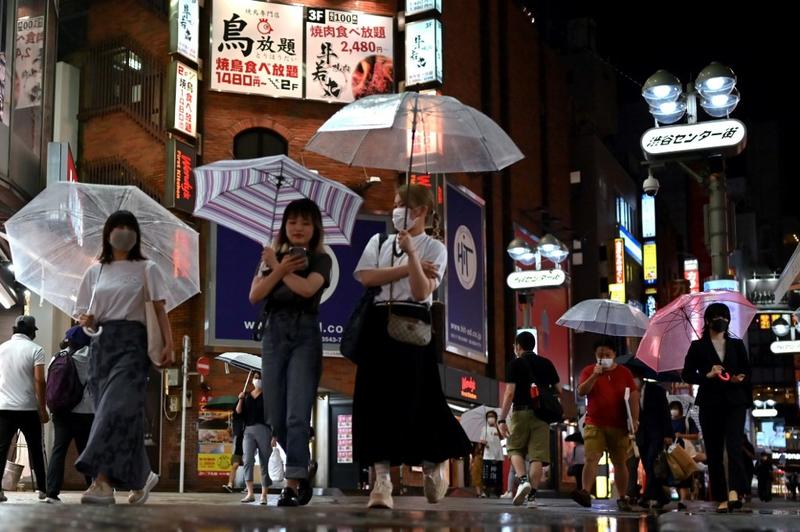 People wearing face masks walk at night in Tokyo’s Shibuya area on June 11, 2020. (PHOTO / AFP)
People wearing face masks walk at night in Tokyo’s Shibuya area on June 11, 2020. (PHOTO / AFP)
TOKYO - The Japanese government is facing potentially damaging blowback after excluding Tokyo residents from a multibillion dollar campaign aimed at reviving domestic tourism, even as the capital on Friday reported a record number of new COVID-19 cases.
Prime Minister Shinzo Abe’s US$16 billion “Go To” tourism campaign was intended to promote travel across the country, but officials agreed on Thursday to exclude Tokyo because of the resurgence in infections there.
Tokyo Governor Yuriko Koike reported 293 new cases on Friday, a fresh daily record after the city recorded 286 cases a day earlier.
Abe has borne the brunt of the negative reaction to Tokyo’s exclusion from the travel subsidy programme, adding to growing criticisms of his handling of the crisis that analysts said could erode his support.
What makes you think that business trips or commuting won’t spread the coronavirus? Do you think it’s fair to exclude Tokyoites from a campaign that’s using taxpayers money.
Ren Ho, Opposition lawmaker, Japan
ALSO READ: Virus: Manila may return to lockdown as infections rise
“What makes you think that business trips or commuting won’t spread the coronavirus? Do you think it’s fair to exclude Tokyoites from a campaign that’s using taxpayers money?” said opposition lawmaker Ren Ho on Friday morning in a tweet addressed to Abe.
The hashtag #TokyoExcluded was trending on Twitter on Friday, amassing almost 100,000 tweets.
Tourism Minister Kazuyoshi Akaba said the decision to exclude Tokyo residents from receiving a 50 percent government subsidy for domestic trips was “heart-breaking.” The subsidy, which kicks in from July 22, will also not be available for anybody travelling to Tokyo.
“The decision was made comprehensively by the government with input from experts,” Akaba told a news conference.
Some critics have said the entire tourism campaign, which also includes subsidies for dining in restaurants and shopping expeditions, should be scrapped given the risk of spreading the coronavirus.
“Originally, the travel campaign was premised on the pandemic having been contained, but they (the Abe government) tried to push it through anyway. They excluded Tokyo, but cases are increasing nationally,” said Tomoaki Iwai, political science professor at Nihon University.
“Voters feel that the prime minister’s office is not making appropriate policy,” creating a feeling of mistrust, Iwai added.
Private credit research firm Teikoku Databank said coronavirus-related bankruptcies reached 350 nationwide as of Friday, with hotels and eateries accounting for about 30 percent of them. Tokyo’s exclusion from the tourism campaign raised concerns about further bankruptcies there, it added.
Steven Reed, professor emeritus at Chuo University, said the last minute change in policy to exclude Tokyo “adds to the number of examples of Abe’s incompetence in governing.”
Abe’s perceived missteps in his handling of the pandemic have included a much derided decision to distribute two cloth masks to each household and a last minute change to a household cash handout programme.
READ MORE: Japan adviser: Tokyo Olympics at risk if coronavirus mutates
“He is certainly not leading in any way like he was before,” Reed said, although he acknowledged the impact on Abe’s support was hard to predict given voters routinely cite a lack of a viable alternative.
Yasutoshi Nishimura, the economic revival minister who is tasked with leading coronavirus containment efforts, last week said Japan had successfully contained the virus without a harsh economic lockdown. In a Wall Street Journal opinion piece, Nishimura cited contact tracing efforts that helped quash transmission clusters.
Japan has reported a total of around 23,000 cases, including nearly 1,000 deaths.
Top government spokesman Yoshihide Suga said Tokyo could be still be included in the travel subsidy programme if infection numbers recede, but also cautioned its exclusion from the dining out subsidies and others was “under consideration”.
Data out this week underscored the plight of the domestic tourism industry, showing just 4 million international visitors in the first half of the year, a tenth of the government’s full-year target of 40 million.


